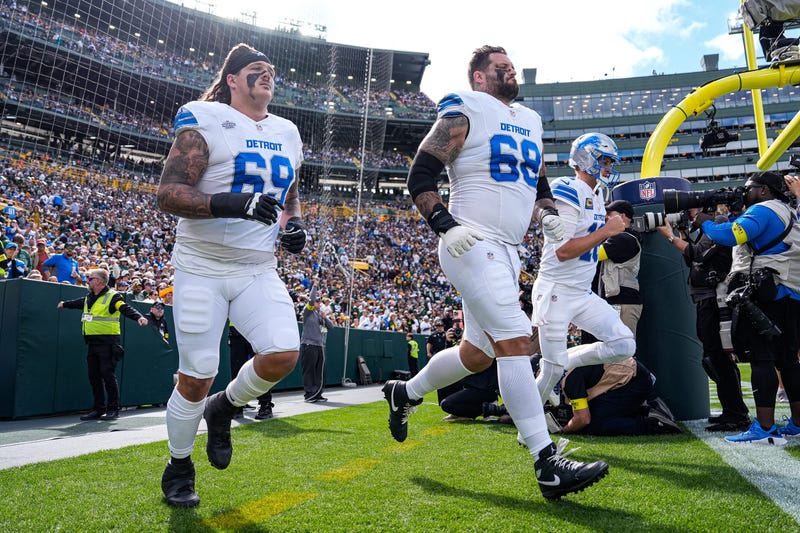
Taylor Decker called it the play "that everybody's talking about." It was the most glaring of several breakdowns for the Lions' offensive line in the team's season-opening loss to the Packers. He wanted to set the record straight.
With the Lions backed up in their own end zone early in the fourth quarter and trying to create some breathing room on third down, they handed the ball off to David Montgomery. Rookie right guard Tate Ratledge went right as center Graham Glasgow went left, leaving defensive tackle Colby Wooden entirely unblocked. It was a minor miracle that Montgomery escaped the end zone to save the Lions from a safety, even while losing a yard.
Turns out, Decker "ran the same play that Tate was running," the veteran left tackle said Wednesday, while Glasgow, Christian Mahogany and Penei Sewell "ran a different play." How does that happen? The simple answer was a theme for the Lions' new-look offensive line in Week 1: miscommunication.
More specifically, the offense went to the line with a primary play and a kill play based on how the Packers lined up on defense. When the Lions killed the first play in favor of the second to account for Green Bay's front, Glasgow, Mahogany and Sewell got the adjustment while Decker and Ratledge didn't. That's how Wooden wound up with maybe the easiest tackle for loss of his career.
"There will be times, sometimes, where we’ll just call it and haul it -- we’re going to run this play no matter what, and we didn’t get the kill," Decker said.
The miscommunications owed largely to the Lions using non-verbal signals and the silent count to combat the crowd noise at Lambeau. The Packers often shifted their defense when Glasgow had his head between his legs preparing to snap the ball, making it harder for the offensive line to stay on the same page. In those cases, it's typically on the guards to scan the defense and relay the last-second checks to the center.
"There were times where guys didn’t hear calls that they need or that were changed on the fly," Decker said. "There's really no excuse for that. All of the stadiums are going to be loud, we’ve got to play on the road, and we can just work on improving from there.”
Decker said the communication on the left side of the line between he and Mahogany is solid. He was also quick to remind Ratledge after the game that everybody makes mistakes, especially rookies in their NFL debut. Ratledge, by his own admission, missed multiple assignments and "did not have my best game mentally."
"He’s going to be fine, he messed up a couple plays. Who doesn’t?" Decker said. "You got guys who played 13 years in the NFL that mess up a couple plays every game. But just because it was glaring, people freak out about it."
Decker added that "nobody feels worse than the players when they mess things up."
"He’s a human being who’s coming into our room and has a high standard and he wants to perform up to that standard and he has expectations for himself — of course he feels terrible about it. And to think anything other than that is just insane. He’s a human being. So, dude, we’ve all been there. We’ve all had stuff that we messed up, and you know what? It’s gonna happen again. It just is."
There is a "bright side" here, Decker said. As he told some of his fellow linemen, "the missed assignments look really bad, but there wasn’t, like, one guy getting his ass kicked the whole game. It was just a lot of things that we can control and clean up."
